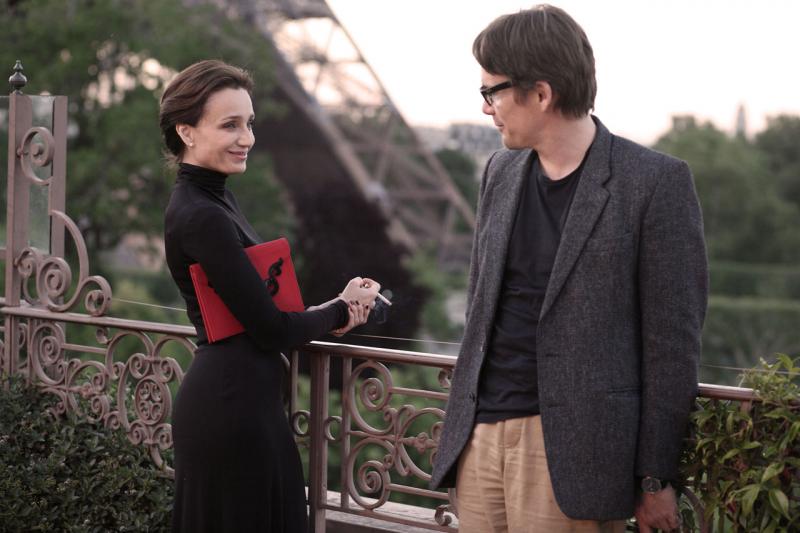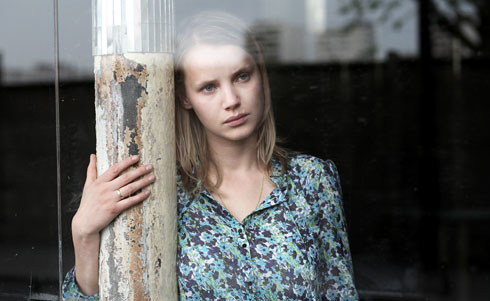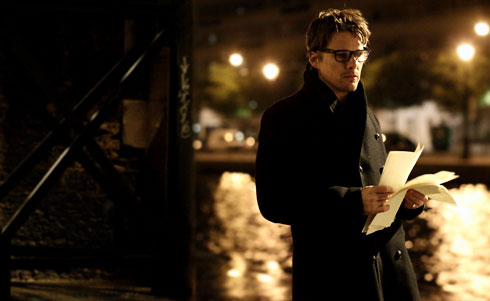The Woman in the Fifth | reviews, news & interviews
The Woman in the Fifth
The Woman in the Fifth
Kristin Scott Thomas and Ethan Hawke enjoy close encounters of a Parisian kind

Challenging the boundaries of reality and the way in which characters exist in and redefine their worlds has become something of a hallmark of director Pawel Pawlikowski. Considering his previous film My Summer of Love, one critic wrote of it as a study of worlds that “exist somewhere on the periphery of normality”.
Ethan Hawke (almost a dead-ringer for novelist Douglas Kennedy, from whose novel of the same name Pawlikowski loosely adapted his script) plays Tom Ricks, an American writer arriving in France to rejoin his French wife and their daughter Chloe. At least that’s how he puts it to the border guard – the reality is that the couple are estranged, and he’s been forbidden from approaching either, with the police ready to intervene. A chance encounter with the girl finds her explaining that she's been told he was in prison, while Tom tells her he's been in hospital.
If Margit is a mystery, she is also a siren
The sense of something spooky in this undefined past is strong, with hints at mental illness, achieved by intercutting the everyday with apparently unconnected scenes in a magic forest that’s both beautiful and threatening. Later we learn that Tom’s first, and only, novel was titled Forest Life and that it’s within this uneasy imaginary world that he has been connecting with his daughter, first in his thoughts, later in the long letters he writes her through the film (shades here of Angela Carter, even Dante’s dark forest).
If these opening developments leave him dislocated, that's only heightened when he’s robbed of his suitcase and wallet and finds himself lost somewhere on the edges of Paris, where the first refuge he finds is a sleazy Arabic café-cum-hotel. It’s peopled by characters all in their own way somehow “lost” – the Arabic owner, a Polish waitress, and an African tenant who speaks to himself loudly in his room – who feature in the story’s development. Tom takes a chance job from the hotelier as night guard in what looks like, but is never defined as, something to do with drug-dealing. (Those for whom Pawlikowski’s treatment of reality seems too oblique may wonder why he doesn’t just call home – if there’s a home to call - for money, let alone how he gets through the whole film looking so dapper without an apparent change of clothes).
 Another chance encounter brings Tom to a literary soiree (the only hint at the troupe of the American writer in Paris which Pawlikowsli seems to be implicity debunking), and an encounter with the beautiful, mysterious Margit (Kristin Scott Thomas), who announces herself as the wife of a Hungarian writer; with her roots drawn from all different corners of Europe, she describes herself, rather less poetically, as a “confused mongrel” (the definition par excellence of a typical Pawlikowski character?)
Another chance encounter brings Tom to a literary soiree (the only hint at the troupe of the American writer in Paris which Pawlikowsli seems to be implicity debunking), and an encounter with the beautiful, mysterious Margit (Kristin Scott Thomas), who announces herself as the wife of a Hungarian writer; with her roots drawn from all different corners of Europe, she describes herself, rather less poetically, as a “confused mongrel” (the definition par excellence of a typical Pawlikowski character?)
If Margit is a mystery, she is also a siren, again alluding to something that works on a more prototypical level than just as part of the story’s development. Tom is drawn into her immediately sexual web, in between seeking chance brief meetings with, or at least glances of, his daughter; conflicts of various kinds appear back at the hotel, as does another more down-to-earth but nevertheless poetic intimacy with the younger Ania (Joanna Kulig). The Polish girl (pictured above right) works behind the bar there, her life as normal as it gets in a Pawlikowski movie.
Events in the “real” world duly encroach on this more internal story, with thriller elements, but to call The Woman in the Fifth a thriller, and then berate it (as some critics have) for its failings in that genre, would be as mixed-up as calling Pawlikowski’s 2000 film Last Resort a study of UK immigration policy.
 The film’s vision of Paris is – with the exception of Tom’s first balcony encounter with Margit, the Eiffel tower in the background – resolutely low-beat. But Polish cinematographer Ryszard Lenczewski (in his third collaboration with Pawlikowski) seeks out scenes of remarkable, everyday, somehow paradoxical beauty in the city, corners of streets and angles that a passer-by would catch only by accident. He plays beautifully with half-lights, both in interiors, and dusk and dawn scenes: it may not delight the Paris Tourist Board, but then Pawlikowski has never shot films for tourist boards (witness his Margate in Last Resort).
The film’s vision of Paris is – with the exception of Tom’s first balcony encounter with Margit, the Eiffel tower in the background – resolutely low-beat. But Polish cinematographer Ryszard Lenczewski (in his third collaboration with Pawlikowski) seeks out scenes of remarkable, everyday, somehow paradoxical beauty in the city, corners of streets and angles that a passer-by would catch only by accident. He plays beautifully with half-lights, both in interiors, and dusk and dawn scenes: it may not delight the Paris Tourist Board, but then Pawlikowski has never shot films for tourist boards (witness his Margate in Last Resort).
Lenczewski colours scenes very distinctively, with Margit’s apartment (in the city's fifth arondissement, hence the film's title) emphasised in dark reds, against the dawn-blue hues associated with Ania’s world. Max de Wardener’s score is integral to the mood too, circling melancholy, with series of ascending chords moving almost unnoticed into more unsettling minor keys.
For various reasons neither of Pawlikowski’s last two projects, one about the life of the young Stalin, reached reality. Not long ago he relocated to Paris, a move which seems to have been amenable in every sense. The Woman in the Fifth reconfirms his status as a European filmmaker (no forgetting, of course, his Polish origins), working in a style different from many of his British contemporaries. I’m not sure his new film will win him many new converts – but for those already sympathetic to his sensibility, it confirms him as a director of considerable originality, quirkier here, always independent.
Watch the trailer for The Woman in the Fifth
The future of Arts Journalism
You can stop theartsdesk.com closing!
We urgently need financing to survive. Our fundraising drive has thus far raised £49,000 but we need to reach £100,000 or we will be forced to close. Please contribute here: https://gofund.me/c3f6033d
And if you can forward this information to anyone who might assist, we’d be grateful.

Subscribe to theartsdesk.com
Thank you for continuing to read our work on theartsdesk.com. For unlimited access to every article in its entirety, including our archive of more than 15,000 pieces, we're asking for £5 per month or £40 per year. We feel it's a very good deal, and hope you do too.
To take a subscription now simply click here.
And if you're looking for that extra gift for a friend or family member, why not treat them to a theartsdesk.com gift subscription?
more Film
 Anemone review - searching for Daniel Day-Lewis
The actor resurfaces in a moody, assured film about a man lost in a wood
Anemone review - searching for Daniel Day-Lewis
The actor resurfaces in a moody, assured film about a man lost in a wood
 Train Dreams review - one man's odyssey into the American Century
Clint Bentley creates a mini history of cultural change through the life of a logger in Idaho
Train Dreams review - one man's odyssey into the American Century
Clint Bentley creates a mini history of cultural change through the life of a logger in Idaho
 Palestine 36 review - memories of a nation
Director Annemarie Jacir draws timely lessons from a forgotten Arab revolt
Palestine 36 review - memories of a nation
Director Annemarie Jacir draws timely lessons from a forgotten Arab revolt
 Relay review - the method man
Riz Ahmed and Lily James soulfully connect in a sly, lean corporate whistleblowing thriller
Relay review - the method man
Riz Ahmed and Lily James soulfully connect in a sly, lean corporate whistleblowing thriller
 Die My Love review - good lovin' gone bad
A magnetic Jennifer Lawrence dominates Lynne Ramsay's dark psychological drama
Die My Love review - good lovin' gone bad
A magnetic Jennifer Lawrence dominates Lynne Ramsay's dark psychological drama
 Bugonia review - Yorgos Lanthimos on aliens, bees and conspiracy theories
Emma Stone and Jesse Plemons excel in a marvellously deranged black comedy
Bugonia review - Yorgos Lanthimos on aliens, bees and conspiracy theories
Emma Stone and Jesse Plemons excel in a marvellously deranged black comedy
 theartsdesk Q&A: director Kelly Reichardt on 'The Mastermind' and reliving the 1970s
The independent filmmaker discusses her intimate heist movie
theartsdesk Q&A: director Kelly Reichardt on 'The Mastermind' and reliving the 1970s
The independent filmmaker discusses her intimate heist movie
 Blu-ray: Wendy and Lucy
Down-and-out in rural Oregon: Kelly Reichardt's third feature packs a huge punch
Blu-ray: Wendy and Lucy
Down-and-out in rural Oregon: Kelly Reichardt's third feature packs a huge punch
 The Mastermind review - another slim but nourishing slice of Americana from Kelly Reichardt
Josh O'Connor is perfect casting as a cocky middle-class American adrift in the 1970s
The Mastermind review - another slim but nourishing slice of Americana from Kelly Reichardt
Josh O'Connor is perfect casting as a cocky middle-class American adrift in the 1970s
 Springsteen: Deliver Me From Nowhere review - the story of the Boss who isn't boss of his own head
A brooding trip on the Bruce Springsteen highway of hard knocks
Springsteen: Deliver Me From Nowhere review - the story of the Boss who isn't boss of his own head
A brooding trip on the Bruce Springsteen highway of hard knocks
 The Perfect Neighbor, Netflix review - Florida found-footage documentary is a harrowing watch
Sundance winner chronicles a death that should have been prevented
The Perfect Neighbor, Netflix review - Florida found-footage documentary is a harrowing watch
Sundance winner chronicles a death that should have been prevented
 Blu-ray: Le Quai des Brumes
Love twinkles in the gloom of Marcel Carné’s fogbound French poetic realist classic
Blu-ray: Le Quai des Brumes
Love twinkles in the gloom of Marcel Carné’s fogbound French poetic realist classic

Add comment